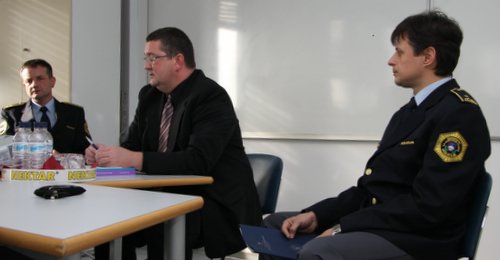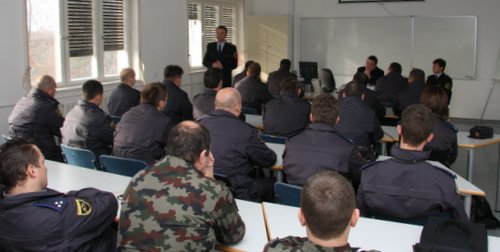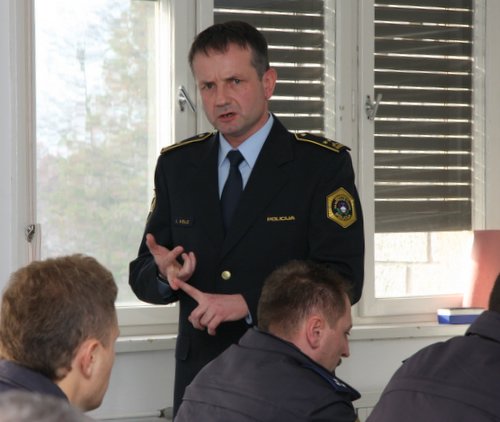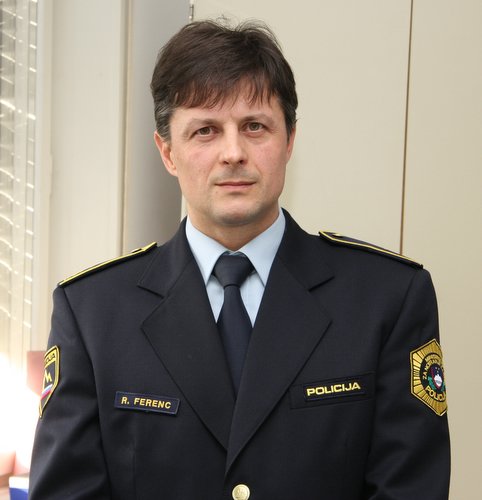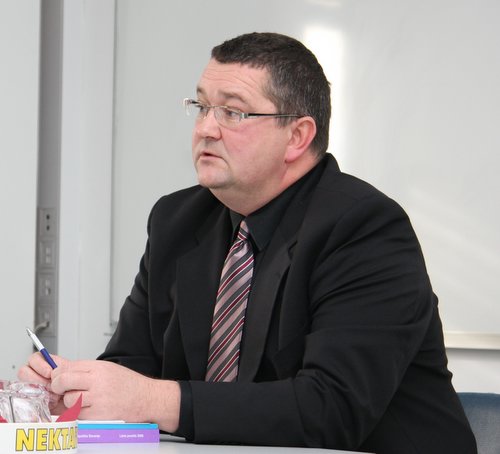To celebrate International Human Rights Day, the Police Academy organised today a lecture on police powers, especially with regard to human rights protection. The Slovenian police devote considerable attention to this area, both through education programmes for police officers as well as in their further training in the field.
Speakers addressing an audience of Police College students (left to right): Police College principal Ivo Holc, Deputy Human Rights Ombudsman Ivan Šelih, and head of the Organisation and Police Powers Section at the General Police Directorate Robert Ferenc.
As a general rule, police procedures in one way or another affect the rights and freedoms of individuals, which makes respect for such rights the basis for police officers' expertise.
In order for the police to ensure a high level of internal safety for all the people of Slovenia, their work has to be grounded on the legal system, European conventions and recommendations, and expertise, along with consistent respect for human individuality and dignity, and great ethical awareness on the part of police officers.
The question of human rights is woven into not only theory and practice of educational programmes of the Police Officers School but also into the training carried out by the Training Centre at the Police Academy. The issue of human rights is also included in several subjects taught at the Police College, which provides police officers with additional and more in-depth formal education (e.g. "Police Powers and Practical Procedure" and "Professional Ethics").
Ivo Holc
Such learning content gives police officers a chance to reflect on what is right and what is wrong, while grasping police ethics as a framework for their professional and private lives. Another important aspect is training police officers for work in a multiethnic society, which increases awareness of diversity and acceptance (with learning the basics of Romani as an upgrade of the project), and training to recognise and control stereotypes in a multiethnic society.
According to Robert Ferenc, though, there are also a few cases every year in which police officers exceed their powers, but none of these have led to severe consequences.
Throughout the year, police officers at police directorates are trained in practical procedures and learn about real life cases in theoretical courses. In this process, their instructors underline the importance of being consistent in following the principles of legality, expertise, humanity and proportionality, particularly when it comes to implementing the powers with which police officers intervene in the most sensitive way in the rights, freedoms, liberty and privacy of individuals, such as in the use of coercive means.
The respect for human rights and freedoms in police procedures is verified through the monitoring and control of police officers' work, with complaints about the procedures carried out by police officers seen as another important indicator. The heads of police units perform thorough investigations into the use of coercive means; in some cases, however, which are primarily linked with serious consequences for persons, such verification is carried out by a special committee.
Special attention is also placed on detention facilities. In recent years, a large number of detention facilities have been renovated and equipped according to standards and based on the recommendations of the Human Rights Ombudsman.
The Slovenian police and the Human Rights Ombudsman have maintained good and normal cooperation for several years now, said Deputy Human Rights Ombudsman Ivan Šelih.
Representatives of the Ombudsman's office have been involved in police education and joint conferences. In addition, the Human Rights Ombudsman has been regularly visiting police stations, where, independent of state institutions, she has been monitoring and verifying whether the rights of individuals and groups are being respected by police officers in their work. The Ombudsman in fact receives suggestions and complaints from people regarding police procedures and is thus entitled to access police facilities and documents, have interviews with the police, etc., all of which must be facilitated by police officers every time the Ombudsman visits a police unit.
"Police respond to all the initiatives within the statutory time limit while taking the Ombudsman's recommendations into consideration as much as possible and eliminating any irregularities and deficiencies discovered in the system", added Šelih.


